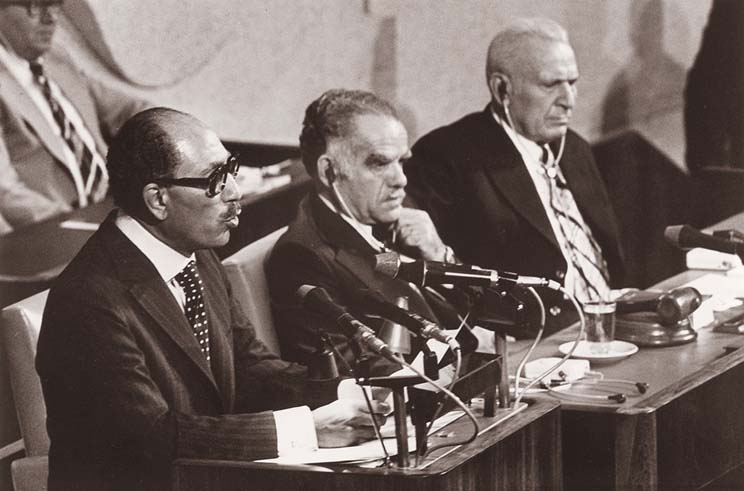
November 19 1977 – 9 Kislev 5738
It was a cliff-hanger by any standards. On the evening of 8 Kislev 5738 (November 17, 1977), Israeli intelligence identified suspicious movements by Egyptian forces on the east bank of the Suez Canal, ceded to Egypt in the cease-fire agreement signed after the Yom Kippur War in 1973. Deputy Prime Minister Yigael Yadin recommended that Israel take no chances and call up the reserve troops in preparation for war. Despite the ongoing trauma of Israel’s unpreparedness for the Yom Kippur War, Prime Minister Menachem Begin and Foreign Minister Moshe Dayan decided, after frantic discussions, to take the risk. They kept the reserves at home, and the next day’s schedule proceeded as planned.
That day, 9 Kislev, was one of the most dramatic in the history of Israel’s foreign relations. Anwar Sadat, president of Egypt, landed in his private jet at Ben-Gurion International Airport, and the mastermind of the coordinated attacks of the Yom Kippur War was received with trumpet blasts, cannon fire, and all due ceremony, broadcast live to millions around the world. The historic visit became an emblem of peace and hope – Sadat spoke the next day in the Knesset, calling for peaceful relations between Israel and Egypt – and passed without incident. This feat was no doubt at least partly the result of the tens of thousands of police and soldiers on alert. Egyptian and Israeli personnel had met secretly to coordinate security, and Dayan had even flown to Morocco in disguise to meet senior Egyptian diplomats.
It was the promise of the Sinai Peninsula’s return to Egyptian jurisdiction that had convinced Sadat to meet Begin in Jerusalem.
“My calculation was that my journey to Jerusalem would break the closed circle we’d been trapped in for so many years. My estimations proved to be accurate.” (Anwar El Sadat: In Search of Identity – An Autobiography (New York: Harper and Row, 1978)
And indeed, Sadat’s visit was the first in a series of events that gradually changed the Middle East. In 1979 the Camp David Accords were signed, with Israel agreeing to withdraw from Sinai in exchange for quiet on its southern border. The resulting uneasy peace has somehow lasted until today. The most painful stage of the withdrawal, still etched deep in the consciousness of many Israelis, was the dismantlement of the Yamit settlement bloc in 1982. The accords also included a clause promising the Arabs of Judea, Samaria, and the Gaza Strip autonomy, a move widely criticized in Israel in subsequent years.
Egypt was undoubtedly the main beneficiary of the peace treaty, gaining the desert expanses of Sinai (with their newly developed oil fields and tourist resorts), closer ties with the West, and substantial American economic and military aid. Sadat, however, paid for his calculated risk with his life. Three years after sharing the Nobel Peace Prize with Menachem Begin, he was assassinated by the Egyptian Jihad on October 6, 1981, the anniversary of the Yom Kippur War he’d declared and lost.
